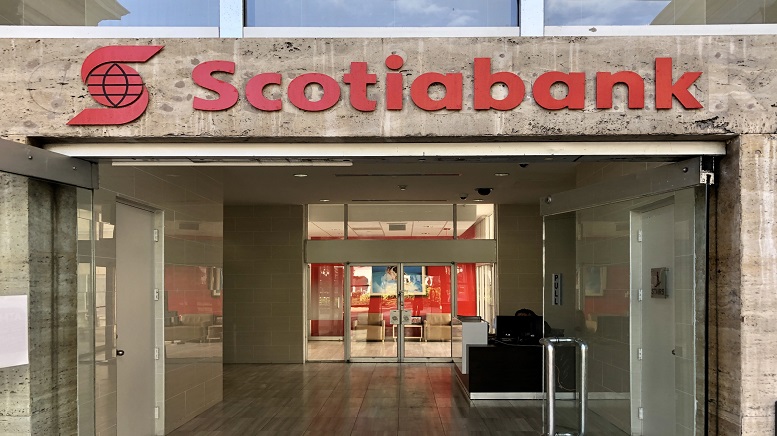
Scotiabank (TSX:BNS)(NYSE:BNS) and Bank of Montreal (TSX:BMO)(NYSE:BMO) kicked off Canadian big bank’s second-quarter results on Wednesday with better-than-expected earnings, which were helped by lower provisions for credit losses and continued loan growth.
Mortgage growth and credit quality remained strong for both banks, helping earnings remain strong, even as financial markets retreated amid recent market turmoil.
Bank of Montreal
BMO, Canada’s fourth-largest bank, reported net income of $7,689 million ($7.13 per share), an increase from $3,320 million ($1.91 per share). Adjusted net income came in at $4,771 ($3.23 per share), up from $4,133 million ($3.13 per share) a year earlier. Analysts forecasted an adjusted EPS of $3.21.
BMO’s results were impacted by the sale of its asset management businesses in Europe and its private banking businesses in Hong Kong and Singapore, which reduced revenue by 3% and expenses by 4%.
The bank’s average loan balances increased 9% year-over-year, which helped boost retail banking profits. Canadian personal and commercial banking profit was up to $940 million, up 21% from a year earlier as revenue rose 11% and provisions for loan losses fell.
The U.S. Personal and Commercial Banking profit of $588 million was up 9% year-over-year. BMO’s US operations, which expanded with the $16.3 billion acquisition of Bank of the West, also benefited from the expansion in commercial lending. Commercial loans in the US rose 9.4% to $85.7 million.
Capital Markets earnings fell 20% to $448 million after four straight quarters of strong results. Higher expenses and provisions for loan losses more than offset higher revenues in global markets and in investment and corporate banking.
Wealth management profits also fell 4% to $314 million, largely due to lost revenue from businesses sold by BMO.
The bank’s capital level swelled, mainly because it raised $3.1 billion by issuing stock to help pay for the acquisition of Bank of the West. BMO’s Common Equity Tier 1 (CET1) ratio was 16%, up from 14.1% in the prior quarter.
The increases in central bank interest rates, intended to curb soaring inflation, are already giving banks a boost in terms of profitability. BMO’s net interest margin on average earning assets increased to 1.69% from 1.64% in the first quarter.
BMO’s provisions for credit losses declined from $60 million last year to $50 million. However, this was a reversal of recoveries made by the bank in the past three quarters.
BMO Financial Group CEO Darryl White commented: “We continued to deliver good financial performance this quarter, driven by broad-based customer loan growth and strong credit quality in our North American P&C businesses, and solid results in our market sensitive businesses even amid more challenging conditions. With consistent and disciplined execution of our strategy, we continue to deliver on our commitment to positive operating leverage, while investing to grow our revenue and drive our Digital-First agenda.”
Along with the earnings release, BMO announced a dividend of $1.39 per common share for the third quarter of 2022, up $0.06 from the prior quarter and 31% from the prior year. The quarterly dividend of $1.39 per common share is equivalent to an annual dividend of $5.56 per common share.
The company is expected to gain further momentum, becoming the fourth-largest commercial bank in North America when Bank of Montreal’s purchase of San Francisco-based Bank of the West from BNP Paribas SA is finalized at the end of this year. Bank of Montreal reiterated that it expects the transaction to close by the end of 2022.
On May 9, BMO announced the launch of BMO NXT LVL, a one-of-a-kind communication platform on Twitch which is known for its massive gaming community. BMO NXT LVL was made with the goal of creating content crossing gaming culture and personal finance.
Scotiabank
Scotiabank, Canada’s third-largest creditor, reported net income of $2,747 million ($2.16 per diluted share) in the second quarter, up from $2,456 million ($1.88 per diluted share) in the prior-year quarter.
Net income, excluding special items, amounted to $2,765 million ($2.18 per diluted share) in the three months (ending April 30th), compared with $2,475 million ($1.90 per diluted share) a year earlier and estimates of $1.96, according to IBES data from Refinitiv.
Scotiabank chief executive Brian Porter revamped the international unit, focusing on larger, more profitable markets and selling smaller, underperforming operations. The unit benefited in the last quarter from growth in mortgages and commercial loans. In Scotiabank’s international banking division, which is focused in Latin America, profits of $613 million were up 49% from the same quarter a year ago, with loan balances up by 9%.
The bank also benefited from lower provisions for credit losses amounting to $219 million, 56% less than it had built up in the second quarter of 2021 to guard against loans that could default. Provisions for already impaired loans and those that are still performing both decreased during the quarter.
The bank’s capital levels declined, with a Common Equity Tier 1 (CET1) ratio of 11.6%, down from 12% in the prior quarter. This decline was partly due to share buybacks, with the bank repurchasing 13.9 million common shares in the second quarter.
Scotiabank’s net interest margin widened to 2.23% in the second quarter of the fiscal year, up from 2.16% in the first quarter. Interest rate increases provided an even stronger boost to the results of Scotiabank’s international business focused in Latin America. The unit’s net interest margin widened to 3.86% from 3.76% in the first quarter.
Scotiabank president and CEO Brian porter commented: “We are pleased with the very strong EPS growth of 15% and a return on equity of 16.4%. Continued loan growth of 13%, and improving net interest margin, strong customer balance sheets, combined with prudent expense management, positions the Bank well to grow its earnings.”
The bank raised the quarterly dividend by $0.03 per share to $1.03 to be paid on July 27. This translates to an annual dividend of $4.12 per share.
Scotiabank has won six awards in the 2022 Global Finance Sustainable Finance Awards, including Best Bank in Canada for Leadership in Sustainable Finance. For the second consecutive year, the Bank was also recognized for its outstanding global leadership in sustainability transparency, making Scotiabank the only major Canadian bank to receive a global award from Global Finance.
BMO stock has fallen over 5% year-to-date, while Scotiabank stock has plunged over 8% over the same period.
Featured Image: Megapixl © Pressfoto












